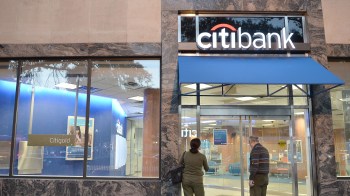Bailouts and rescue efforts keep coming
TEXT OF INTERVIEW
Tess Vigeland: Thanksgiving week is generally a pretty quiet one in the world of finance. The turkeys on Wall Street take a breather to consume one of their own. But not this year.
No, this week one of the nation’s largest banks Citigroup teetered on the edge of collapse and the Federal Reserve made yet another stab at salvaging the economy by throwing money at it.
Marketplace’s Bob Moon joins us to review some of this week’s developments in the financial crisis. Bob, exactly what happened?
Bob Moon: It was a government bailout in every sense of the word, so you should notice no change if you’re a retail customer of Citigroup, but a lot of analysts are saying that the government may have just bought some time for Citigroup here. Mainly shareholders should be the ones who would be concerned here about the status of their investments, but otherwise, if you’re just a customer, you should be OK.
Vigeland: And once again, as in any other bank, you have the FDIC protections and your mortgage would probably be assumed by another bank if something ever did happen to Citi, but it sounds like this is one of those “too big to fail” situations.
Moon: Exactly. There is some pressure on Citigroup to maybe spin off some of its brands — Smith Barney and CitiFinancial and that sort of thing — and so you may see a change of name
in the future, but not right now.
Vigeland: OK. Let’s move on to the Fed. The Fed did something that seemed to surprise some economists this week. Tell us exactly what they did and what it means.
Moon: Yeah, on Tuesday the Federal Reserve unveiled this plan to buy around half a trillion dollars in mortgages that are backed by Fannie Mae, Freddie Mac, and Ginnie Mae and the idea there is that the government buys up all the outstanding mortgages and this massive infusion of cash provides more money for new home loans and that pushes interest rates lower. The hope is that gets more people borrowing and buying.
Vigeland: And in fact, we did see that home mortgage interest rates dropped.
Moon: Indeed, it did have an immediate effect. Some mortgage traders saw interest rates for a fixed-rate mortgage with no fees or closing costs tumble to as low as 5.25 percent from around 6.5 percent. Now keep in mind those are rates for homeowners with good credit scores who have plenty of equity in their homes, but that was the sharpest drop in almost seven years and it did touch off something of a rush to refinance. The good news is just this refinancing activity could be a much needed shot in the arm for the economy. Let’s say it puts, oh, $200 a month in your pocket. Well that’s extra spending money — that’s exactly what the economy needs right now.
Vigeland: And as we head into what is supposed to be the biggest spending season of the year.
Moon: That’s right. Some economists say things won’t really improve until we really start spending again. Well, the Commerce Department reported on Wednesday that consumer spending dropped at its steepest rate in more than seven years in October and especially for orders for big-ticket items. We haven’t seen that sort of activity improving so maybe this activity from the Fed will help.
Vigeland: Alright. Marketplace’s Bob Moon, thanks so much as always.
Moon: Thanks Tess.
There’s a lot happening in the world. Through it all, Marketplace is here for you.
You rely on Marketplace to break down the world’s events and tell you how it affects you in a fact-based, approachable way. We rely on your financial support to keep making that possible.
Your donation today powers the independent journalism that you rely on. For just $5/month, you can help sustain Marketplace so we can keep reporting on the things that matter to you.


















